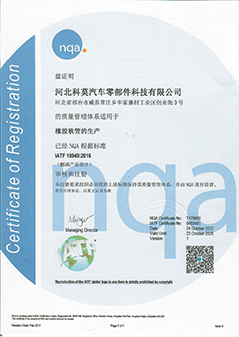oil fuel line
Nov . 08, 2024 21:46 Back to list
oil fuel line
The Importance of Oil Fuel Lines in Today's Engines
In the realm of combustion engines, whether they power vehicles, machinery, or generators, the fuel system plays a paramount role in efficiency and performance. One of the crucial components of this system is the oil fuel line. This article explores the significance of oil fuel lines, their functionality, maintenance, and the emerging technologies that are shaping their future.
Understanding Oil Fuel Lines
Oil fuel lines are tubes designed to transport oil or fuel from the tank to the engine's fuel injection system or carburetor. They are typically constructed from durable materials such as rubber, metal, or reinforced plastics, which can withstand high pressure and adverse environmental conditions. The quality and integrity of these lines are essential for the effective operation of the engine, as they ensure a consistent supply of fuel that is free from contaminants.
Functionality and Importance
Oil fuel lines serve several essential functions in an engine's operation. First and foremost, they transport fuel, allowing the combustion process to occur efficiently. For internal combustion engines, the consistency of fuel delivery is crucial; any interruption can lead to performance issues, including stalling, misfiring, or reduced power output.
Moreover, oil fuel lines play a role in maintaining fuel quality. As fuel travels through the lines, it can pick up contaminants that may affect engine performance. A well-maintained oil fuel line system incorporates filters to prevent debris and impurities from entering the engine. This filtering not only prolongs engine life but also enhances fuel efficiency.
Maintenance of Oil Fuel Lines
oil fuel line

Ensuring the longevity and reliability of oil fuel lines requires regular inspection and maintenance. Over time, fuel lines can suffer from wear and tear, leading to leaks or ruptures. Signs of a failing fuel line may include visible cracks, discoloration, or gasoline smells. Regularly checking for these indicators can prevent more severe problems, including engine failure or fire hazards.
When maintaining oil fuel lines, it is crucial to replace them if any damage is detected. While this can be a straightforward task for DIY enthusiasts, professionals should handle more complex installations to ensure proper fittings and connections. Moreover, using high-quality fuel line products will reduce the frequency of replacements and improve the overall performance of the engine.
Emerging Technologies
The automotive industry is witnessing a shift towards more sustainable and cleaner technologies. With the advent of electric vehicles (EVs) and alternative fuels, the role of oil fuel lines is evolving. Manufacturers are investing in innovative materials that withstand not only traditional fuels but also biofuels and other non-conventional fuel types.
Additionally, the integration of smart technologies into fuel systems is becoming more prevalent. Sensors that monitor the condition of oil fuel lines in real-time can alert drivers to potential issues before they develop into significant problems. Such advancements contribute to better vehicle performance, lower emissions, and ultimately a reduced carbon footprint.
Conclusion
In summary, oil fuel lines are a critical component of the fuel system in combustion engines, impacting performance, safety, and efficiency. Regular maintenance and monitoring are essential to ensure their integrity and prevent costly repairs. With the industry moving towards greener technologies and smarter systems, the future of oil fuel lines looks promising, promising innovation and improved functionality. Whether in traditional gasoline engines or new-age alternatives, the importance of oil fuel lines remains, underscoring the need for continual adaptation and improvement in automotive technologies. As the landscape of transportation continues to evolve, understanding and investing in the efficiency of all parts of the fuel system, including oil fuel lines, will remain crucial for optimal engine performance.
